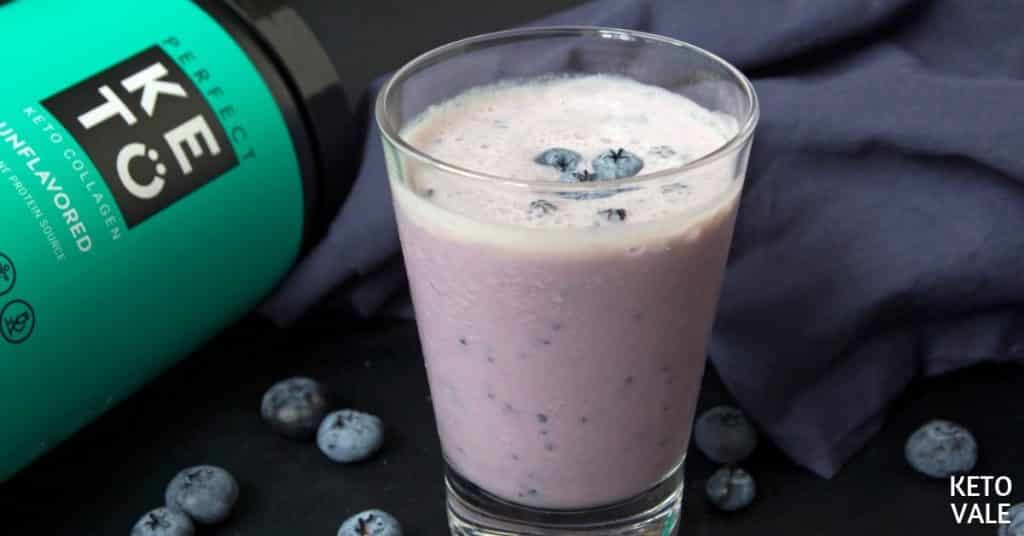Cow’s milk is one of the first foods you’ll need to give up if you go on a low-carb or keto diet because it contains too many carbs and sugar. Additionally, it’s highly inflammatory for many people and can lead to digestive issues, especially among those with autoimmune conditions.
Luckily, almond milk is an excellent alternative to cow’s milk. It’s low in carbs and contains no hard-to-digest milk sugars – but there are several things to keep in mind when buying it at the store. In this guide, we’ll discuss how to include almond milk in your low-carb or keto diets!
Almond Milk Nutrition Facts Table
A 100-gram serving of unsweetened almond milk contains the following (*):
- 15 calories
- 0.96 grams of fat
- 1.31 grams of carbs (1.11 grams net carbs)
- 0.2 grams of fiber
- 0.4 grams of protein
Store-bought almond milk is usually a good source of fortified calcium and vitamin D because food companies realize that so many people use it as an alternative to cow’s milk. It also contains iron, magnesium, phosphorus, potassium, vitamins A and E, and some B vitamins.
How Many Carbs In Almond Milk?
Store-bought almond milk comes in a variety of options and flavors that may impact its carb content. However, as long as you get the unsweetened and plain kind, it will contain around 1 gram of net carbs per 100 gram serving.
Watch out for flavored nut milk, such as chocolate, strawberry, or vanilla almond milk, which is usually sweetened with sugar and will have more carbs.
The best way to keep the carbs down is to make your own almond milk at home with keto-approved sweeteners. It’s easier to make than you think!
You can follow our step-by-step guide on how to make homemade nut milk.

Is Almond Milk Healthy?
As long as you are not allergic to nuts, then – yes, almond milk is extremely healthy! It’s an excellent replacement for cow’s milk for people who cannot tolerate dairy or eat carbs, such as the autoimmune, vegan, plant-based, and low carb or keto communities.
Almond milk is lower in sugar AND calories than cow’s milk. Plus, it contains significant amounts of vitamin D and calcium, which is why most people drink cow’s milk to begin with.
Calcium and vitamin D are needed for proper bone formation as well as growth and development. Vitamin D is also crucial for immune health.
Low levels of vitamin D have been linked to serious health conditions, such as autoimmune disorders, heart disease, and even severe upper respiratory reactions (*)(*)(*).
Almond milk is also a good source of vitamin E, which has antioxidant abilities in the body. It helps reduce inflammation, fight oxidative damage, and keep our cells and tissues healthy.
Cow’s milk contains more protein than almond milk, but you don’t usually need to worry about this if you are on a low-carb or keto diet because there are so many other high-protein foods available to you.
Plus, almond milk does NOT contain lactose – a problematic milk sugar that so many adults and children cannot digest. This makes almond milk a great anti-inflammatory alternative to cow’s milk, allowing those with sensitivities to enjoy cereal, smoothies, yogurt, and milk again.
Unsweetened almond milk is also a great choice for diabetics or those with insulin sensitivities because it contains almost no sugar and a low glycemic index of 25.
Almond milk does not contain as much fiber as eating whole, raw almonds. So, if your goal is to get more nuts in your diet for their fiber and heart-healthy fat content, then keep in mind that it’s best to eat them in whole form.
Is Almond Milk Keto-Friendly?
Yes, almond milk is keto-friendly as long as it’s unsweetened or made with keto-approved sweeteners, such as monk fruit, stevia, or erythritol.
If you’re buying nut milk from the store, make sure it contains NO added sugars or carrageenan – an organic additive that may contribute to intestinal inflammation (*).
You can find this information listed in the ‘ingredients’ section of the nutrition label. Many brands will also state ‘carrageenan-free’ on the front of the label.
It’s best to make your own nut milk at home if you are on a strict keto or low carb diet because you can control what goes in it. We recommend using organic almonds and a keto-approved sweetener.
However, if you are using almond milk to meet your calcium and vitamin D needs, then you may want to consider incorporating unsweetened fortified store-bought milk into your diet.
Keep in mind that store-bought nut milk may last longer because it will likely contain more preservatives. Homemade nut milk should be used up as soon as possible.
Try using it in a smoothie, low-carb baking, or your morning coffee. You can also buy almond-milk yogurt as long as it’s unsweetened.
Check these keto recipes with almond milk you can try:
- Blackberry Cheesecake Smoothie with Almond Milk
- Almond Milk Chocolate Panna Cotta
- Strawberry Avocado Collagen Protein Milkshake
Final Thoughts
Almond milk is a keto-friendly staple for many low-carb dieters. It contains about 1 gram of carbs per 100-gram serving, making it the perfect substitution for cow’s milk.
Be sure to look for a store-brand version of almond milk that is free from sweeteners and carrageenan.
You can also make your own at home to ensure the use of keto-friendly ingredients, such as no-calorie sweeteners, organic almonds, and no additives.
Enjoy almond milk in smoothies, coffee, low-carb baked goods, cereal, or drink it as it!
See more:







